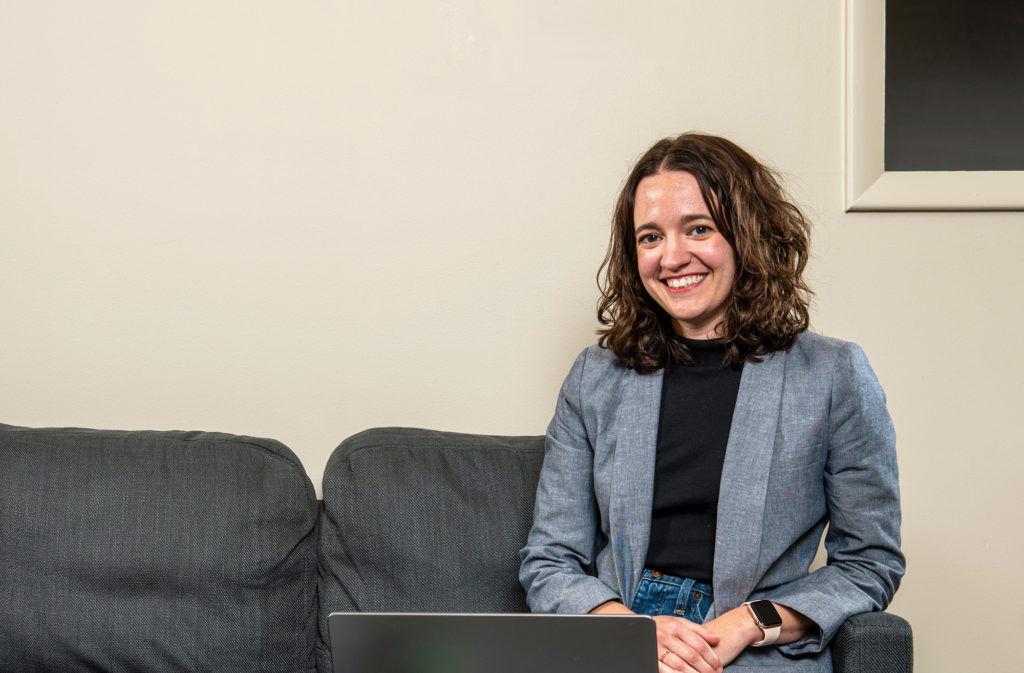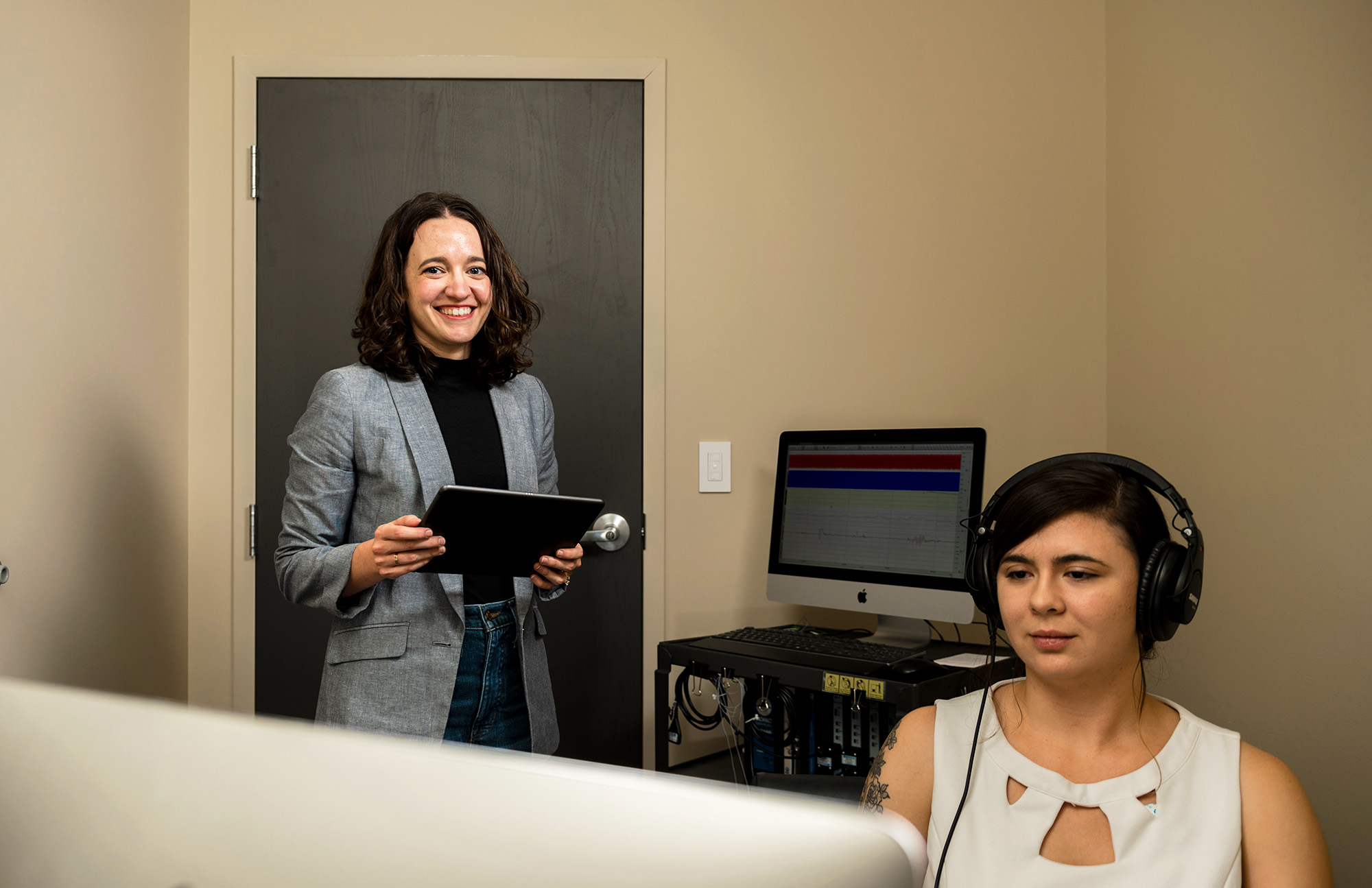First Person
Careers Up Close: Amy Belfi on Music Perception and Cognition

Photo above: Amy Belfi in her lab space at Missouri University of Science and Technology.
Amy Belfi is an assistant professor at Missouri University of Science and Technology. Using techniques including functional neuroimaging, psychophysiology, neuropsychological studies of patient populations, and more, she researches the impact that audio and music have on the brain and our behaviors.
Current role: Assistant professor of psychological science, Missouri University of Science and Technology, 2017–present
Previously: Postdoctoral associate, New York University, 2015–2017
Terminal degree: PhD in neuroscience, University of Iowa, 2015
Recognized as an APS Rising Star in 2021
Starting from scratch
After I received my PhD, I moved to New York City and worked as a postdoc at New York University (NYU) on an interdisciplinary project focused on neuroaesthetics. We were interested in studying aesthetic responses to three types of artistic products: poetry, visual arts, and music.
It was a great experience for many reasons. First, I got to work in two areas that I had zero prior experience with (poetry and visual arts), so I learned a lot about those other artistic domains. People tend to focus on one type or modality of art, so I see it as a real asset that I was trained by researchers with expertise in these various domains. In addition, I hadn’t had a ton of fMRI experience in graduate school, so I learned a new method—basically from scratch. I also had some incredible mentors during my postdoc (Gabi Starr and David Poeppel to name two of many) who are still wonderful mentors to this day.
And, lastly, it was really fun to live in NYC for a few years. I realized that I’m a Midwesterner through and through, but I think everyone should live somewhere totally different for a year or two to be exposed to different ways of life.
Finding work close to home
I found the job ad for my current position on the Psychology Job Wiki back in 2016. I vividly remember seeing the job posting because I was so excited to see something relatively close to St. Louis (STL), which is my hometown. I had always hoped I could move back to STL, but knowing the academic job market and the fact that there aren’t always jobs available in the exact area you want to live, I knew it would be a long shot. I applied for the job in fall of 2016 and then did a phone interview followed by an in-person interview.
I also wasn’t sure how I would like it because my university is mostly engineering-focused. But when I got there, I really liked the faculty in the psychology department (shout out to my colleagues for being amazing). So, I was pretty excited when they offered me the job.
Music and aging
When I became an APS Rising Star in 2021, I was conducting research on a variety of topics in the field of music perception and cognition. More specifically, some of my lines of research include studies looking at the relationship between music and autobiographical memories, aesthetic judgments of music (e.g., why do we like the music that we like?), and musical anhedonia, which is a selective loss in pleasure for music.

One new development since becoming a Rising Star is that I was awarded an R15 AREA grant from NIH to look at music, emotion, and autobiographical memory in healthy aging. The aging component of this project is pretty new to me, so I’m really excited to start working on these experiments. We’re just getting a few tasks up and running in the lab as we speak!
Setting students up for success
A large part of my job involves teaching and mentoring undergraduate students. I teach two undergraduate courses each year: a cognitive psychology course and a neuroscience course. My department is actually primarily undergraduate (we have a master’s program in industrial/organizational psych, but because it isn’t my area I don’t typically work with master’s students).
In my lab—which is comprised of undergraduate students and my post-baccalaureate lab manager—I usually try to start students off with fairly straightforward tasks that they can easily become competent in (e.g., data entry, data coding, etc.) before moving on to higher-level tasks like data analysis or conducting their own independent project.
I also put students together on teams focused on a specific project or component of a project and try to make sure my lab is composed of students at different stages, so more senior students who have been in the lab longer can help train and mentor junior students.
My goal is to have every student who’s been in my lab for at least a year have co-authorship on at least one publication, and I have been successful so far.
Loving the work
Honestly, I love basically everything about my work. I feel so lucky to have this job. Teaching is fun because I get to reach a lot of students, and I learn a lot myself by having to teach a broad range of topics.
It’s great when students ask questions in class that I don’t know the answer to because I get to learn something new. I actually really enjoy doing service too, because it feels like I’m helping out my department, university, and the field as a whole. I love serving my professional societies, like the Society for Music Perception and Cognition, because it’s really fun to meet and work with colleagues in the field (and the music science community is truly the best!).
Probably my favorite part of my job is conducting research and mentoring undergraduate students in the lab. I love getting to ask interesting questions about music and how it evokes memories and emotions. It’s so fun to see students learn about conducting research for the first time and help them run experiments, analyze data, and write manuscripts. It’s the best feeling seeing students successfully present posters or have their manuscripts accepted for publication.
Winning over skeptics
One challenge I’ve faced in my career is the two-body problem, as my husband and I met during our PhDs and we both pursued academic jobs for a while. He ultimately decided he would rather be in industry, which made it much easier for me to continue pursuing academia. We both worked hard, but there is a huge element of luck that we both found jobs we’re happy with and were able to move to the exact city we wanted.
Another challenge I have faced was trying to convince people that the work I do is interesting and important. When I started doing music research at the beginning of my PhD, I faced quite a bit of skepticism. I was once advised to not position myself as a “music person,” but instead as someone who studied something else (like memory or language) and did music research on the side. Honestly, that’s still probably not terrible advice, but there have been huge changes in the past 10 years in terms of acceptance of music science from the broader scientific community, as we’ve seen with things like the Sound Health initiative from NIH. In the end I’m so happy to be a “music person,” and I don’t think I would be as satisfied with my job if I’d tried to position myself as something else.
Looking forward to learning more
Fingers crossed, but I’m hoping that I will receive tenure next year. I keep telling myself I’ll try to take it easy for a few months after that, but we’ll see. (It’s great timing that the new Zelda game is coming out right when I’ll hopefully get tenure, because I will definitely take at least a week off to focus on that.)
I’ll also try to retool my courses, and I’d love to work with others at my university to better sequence or integrate the neuroscience coursework that’s across many departments—maybe establish an interdisciplinary neuro minor or something. For the near future, I’ll be diving into these music, memory, and aging projects, and I hope to establish a registry of older adult participants for future studies. I also recently purchased some functional near-infrared spectroscopy (fNIRS) equipment, which will be a new method for me. I’m really excited to start learning that and I think it will be a great training experience for my students.
Advice for budding researchers
Get your papers out! It’s important to balance being thoughtful and careful in your work with knowing when a paper is done and ready to be sent out. I often think of Alec Baldwin’s line from the movie Glengarry Glen Ross: “Always be closing.”
Another motto I established for myself early on was to try for everything and don’t be afraid of failing—if I saw a grant or a job that I thought might fit but maybe wasn’t 100%, I still went for it. I didn’t think I would be a perfect fit for my postdoc, but I applied anyway and got the job.
Don’t be ashamed to ask people to nominate you for things (that’s how I got the APS Rising Star). Put yourself out there and get to know people in your field. Success in this job is always based on the evaluations of others, from peer reviewers of your papers, external letter writers for tenure, hiring committees for academic jobs, etc.
And of course, just be a nice person and treat people kindly. My postdoc advisor had a sign that read, “Work hard and be nice to people,” in his office, and I think that’s truly the best advice for being successful in this career.
Feedback on this article? Email [email protected] or scroll down to comment.





APS regularly opens certain online articles for discussion on our website. Effective February 2021, you must be a logged-in APS member to post comments. By posting a comment, you agree to our Community Guidelines and the display of your profile information, including your name and affiliation. Any opinions, findings, conclusions, or recommendations present in article comments are those of the writers and do not necessarily reflect the views of APS or the article’s author. For more information, please see our Community Guidelines.
Please login with your APS account to comment.